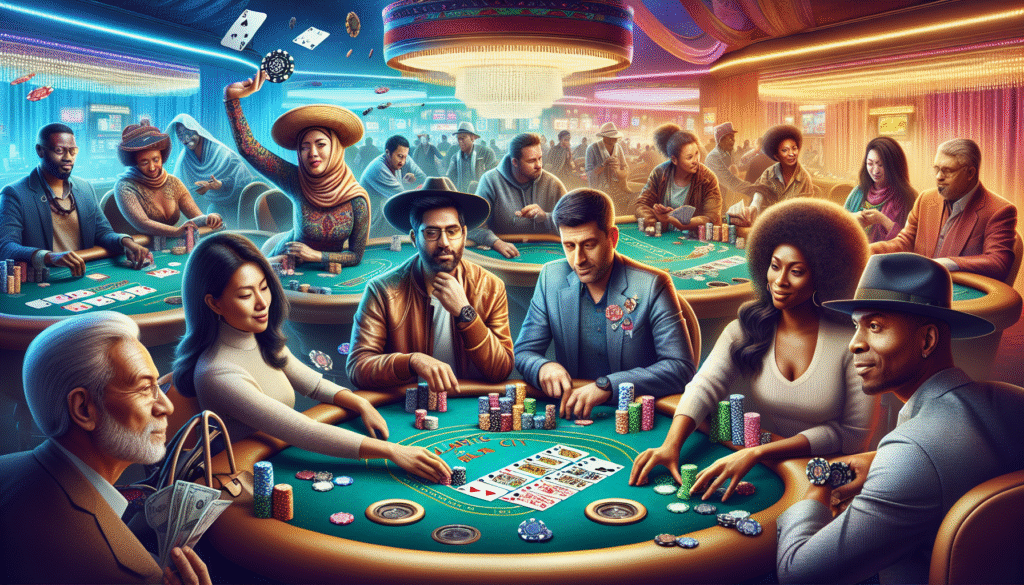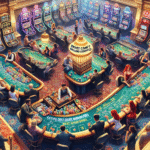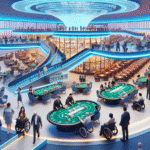
Poker Rooms in Atlantic City: Smart Casino Travel & Table-Game Strategies
Atlantic City has long been known for its vibrant gaming scene. For both the casual traveler and the serious player, a trip centered around Atlantic City’s poker rooms can offer a highly rewarding experience. This comprehensive guide is dedicated to helping casino travelers play smarter and travel better, using advanced table-game insights, real-world case studies, and tools like Wizard of Odds, Vegas Advantage, and Blackjack Apprenticeship.
Understanding Poker Rooms in Atlantic City
Poker rooms in Atlantic City such as the Borgata, Harrah’s, and Tropicana facilities are not just gaming venues—they are dynamic hubs where strategic play meets travel logistics. With new policies in 2024-2025, it is essential to be aware of both the rules and the available comp systems. In this guide, we will dig deep into the best practices to manage bankrolls, spot the low-edge traps (like 6:5 blackjack ratios), and maximize your comps through loyalty programs like MGM Rewards and Caesars Rewards.

Strategic planning is not just about your game, but also about your travel. Understanding the time-of-day player trends and table minimums—often fluctuating from as low as $5 to $10—can drastically reduce your expected hourly loss. Advanced travelers use detailed bankroll math and rules comparisons to decide which table to sit at, based on factors like rule variations (3:2 versus 6:5 blackjack) and volatility measurements.
Advanced Table-Game and Travel Strategies
Optimizing Your Game Play & Bankroll
The mathematics behind table games provide insight into risk management. For example, the expected hourly loss formula is often given as:
Expected Loss = Bet Size x Decisions per Hour x House Edge
Consider a scenario: If you bet $10 per hand, play 60 decisions per hour, and face a house edge of 1.41% (as in some craps scenarios), your expected hourly loss calculates as:
Expected Loss = 10 x 60 x 0.0141 = $8.46 per hour
This simple calculation can be expanded with variables for variance and risk-of-ruin, allowing you to develop a more robust session plan complete with bankroll envelopes and ETGs (Estimated Time Guidelines).
Spotting and Avoiding Low-Edge Traps
Low edge rules such as 6:5 blackjack instead of the classic 3:2 can result in an increase in the house edge by approximately 1.39%—a significant change over extended sessions. Likewise, rule variants like Hit Soft 17 (H17) can add an extra 0.22% to the house edge. A clear understanding of these subtleties allows a traveler to choose tables carefully.
Comparing Poker Rooms by Real-World Data
Below is a table comparing key features and player incentives at leading Atlantic City poker rooms:
| Property | Table Minimums | Rule Variants | Loyalty/Comp Value |
|---|---|---|---|
| Borgata | $10 – $25 | Standard 3:2, occasional 6:5 tables | MGM Rewards integration, high turnover comps |
| Harrah’s Atlantic City | $5 – $20 | Mix of S17 and DAS (Double After Split) | Caesars Rewards, special poker tournaments |
| Tropicana | $10 – $30 | Innovative rule mixes, variable minimums | Wynn Rewards style program, bonus events |
When assessing these venues, consider the quality of the tables, the expected play time, and the integrated travel tools like Vegas Advantage for up-to-date table minimum surveys.
Leveraging Real-Time Tools for Smarter Casino Travel
Successful casino travelers rely on real-time tools and resources to fine-tune their strategies. Some of the most effective resources include:
- Wizard of Odds: Offers calculators that allow you to compare rule variants, complete with expected loss computations and house edge breakdowns.
- Vegas Advantage: Provides a comprehensive table-minimum survey, detailing low-minimum tables across various Atlantic City properties.
- Blackjack Apprenticeship: Shares detailed charts and mathematical breakdowns that can highlight when and where to avoid progressive traps, like the 6:5 tables.
- PokerAtlas: Keeps you informed on poker tournaments, room capacity, and upcoming events in Atlantic City.
Each tool provides unique data points: their coverage ranges from global properties to hyper-local surveys, ensuring you have fresh, actionable data before your trip. Integration into your trip planning workflow can be as simple as bookmarking the loyalty dashboard or running a quick ETG calculation before you head to the venue.

Calculator Example: Expected Hourly Loss
Below is a minimal JavaScript snippet that you can use in a spreadsheet or on your personal webpage to calculate your expected hourly loss:
function calculateExpectedLoss(betSize, decisionsPerHour, houseEdge) {
return betSize * decisionsPerHour * houseEdge;
}
// Example: $10 bet, 60 decisions, 1.41% edge
console.log(calculateExpectedLoss(10, 60, 0.0141)); // Expected loss = $8.46
This formula is a basic but powerful tool to adjust your play strategy and decide which table is worth your time based on risk tolerance and session length.
Case Study: A Smart Atlantic City Poker Trip
Meet Alex, a dedicated poker traveler who recently embarked on a 3-day Atlantic City trip with a $900 bankroll. His goal was to maximize his play time while minimizing exposure to high house edge traps.
Trip Overview
- Budget: $900 bankroll
- Duration: 3 days
- Main Tools: Vegas Advantage survey, Wizard of Odds calculator, internal bankroll management guide
Alex started his trip by using the Vegas Advantage tool to locate lower minimum tables. At Harrah’s, he found a table offering a mix of SAS (Stand and Split) and DAS rules, which provided a more favorable risk-reward profile compared to the higher minimums running at Tropicana.
Quantified Outcomes
After a full day of play, Alex calculated his expected loss per hour using the provided formula. With a bet size of $10 and 60 decisions per hour at a 1.41% edge, he confirmed an expected loss of approximately $8.46 per hour. By managing his bankroll envelopes effectively, Alex extended his playtime and captured valuable comps through Caesars Rewards, turning a potentially challenging night into a series of optimized plays.
This case study underlines how data-backed decision making can substantially improve not just your game, but your overall casino travel experience.
Responsible Gaming & Regulatory Insights
While leveraging the best tools and strategies is key to successful play, it is equally important to adhere to responsible gaming guidelines. Regulatory bodies ensure fair play and provide resources for self-control:
- Nevada Gaming Control Board (NVGCB): Sets guidelines for fair gaming, ensuring that players are informed of risk factors.
- UK Gambling Commission (UKGC): Offers tools for self-exclusion and deposit limits.
- DICJ Macau: Updates policies affecting Asian markets and table-game strategies.
- Liquor & Gaming NSW: Informs on domestic policies concerning casino operations in Australia.
Before planning your next trip, visit the official pages of these authorities to get the latest updates and tools like deposit limit calculators that ensure you never overextend your play or bankroll. These resources are a vital part of informed casino travel.
Next Steps and Internal Resources
For further deep dives into casino travel and bankroll management, explore our Bankroll Management Guide and check out our Vegas Low-Minimum Tables 2025 article. Both resources provide real-world examples and actionable insights, helping you build a comprehensive strategy for your next Atlantic City trip.
Always remember: smart play starts with careful planning and continuous learning. Use the tools, consult the guides, and recalibrate your strategy based on the latest data.






